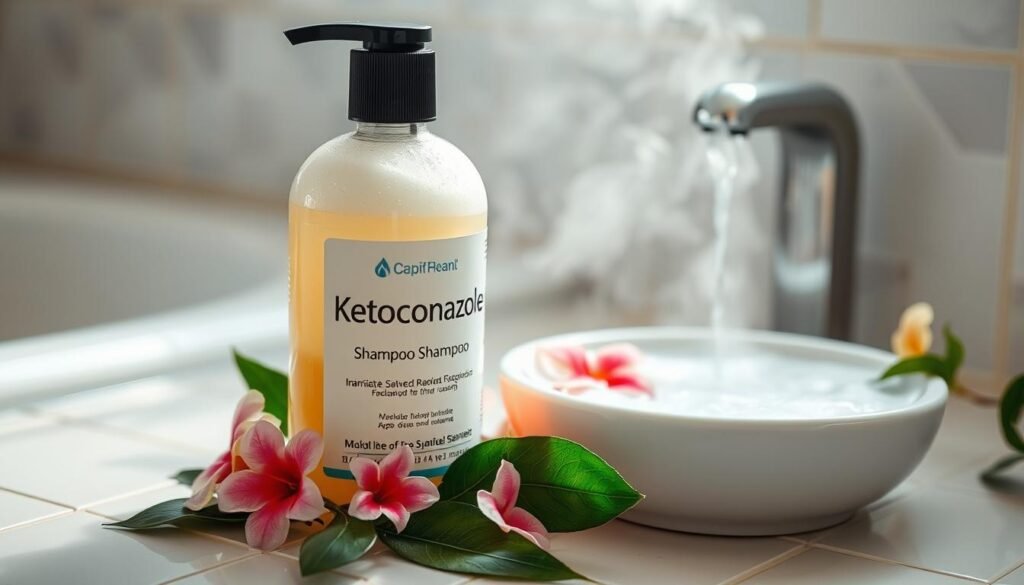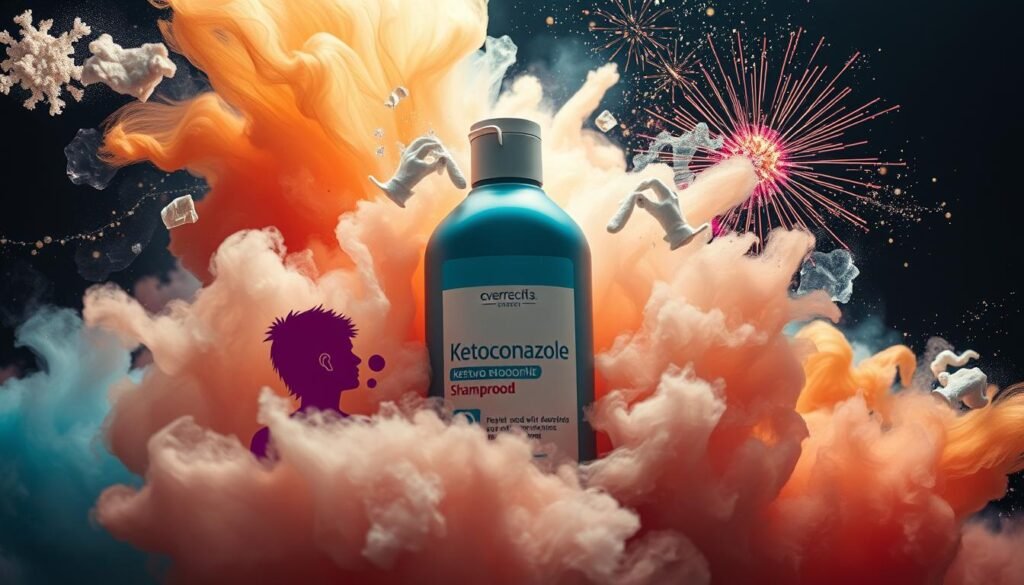Did you know almost half of people get dandruff at some point? It’s not only annoying but also embarrassing. Luckily, *Ketoconazole Shampoo for Dandruff* is a strong solution. It works better than many other anti-fungal shampoos, which makes it a go-to option for beating dandruff.
This guide tells you how Ketoconazole fights dandruff and why it’s beneficial. You’ll learn why it’s important to know what causes dandruff. Plus, you’ll find out how different ingredients in shampoos help. Reading reviews from other users will also help you see how well it works.
To learn more, compare different dandruff shampoos at your own pace. For recommendations, here’s a list of good dandruff shampoos.
Key Takeaways
- Dandruff affects nearly 50% of people at some point.
- Ketoconazole is an effective anti-fungal treatment for stubborn dandruff.
- Proper use of Ketoconazole Shampoo is essential for maximizing benefits.
- User experiences highlight both successes and challenges with dandruff treatment.
- It’s important to be aware of potential side effects when using anti-fungal shampoos.
Understanding Dandruff and Its Causes
Dandruff is a widespread scalp issue causing rapid shedding of dead skin. It leads to visible flakes that can be annoying. It impacts people of various ages, especially teens and adults in midlife. Many ask what is dandruff and seek reasons for its occurrence.
What is Dandruff?
Dandruff isn’t just a dry scalp but involves several causes. One main cause is seborrheic dermatitis, which is skin inflammation in oily areas, including the scalp. It’s problematic due to itching and flakes. This issue affects infants, children, and adults.
Common Causes of Dandruff
Knowing the common causes of dandruff is key to fighting it. Reasons include:
- Malassezia fungus overgrowth in oily scalp areas.
- Exposure to extreme sunlight or very harsh weather.
- Skin issues like psoriasis or eczema leading to flaky skin.
- Lack of zinc and vitamin B, making symptoms worse.
For some, changing shampoo or how often they wash their hair helps with mild dandruff. Those with severe dandruff might need medicated shampoos, like Ketoconazole. Understanding what is dandruff better helps tackle this common problem.
The Role of Ketoconazole Shampoo in Dandruff Treatment
Ketoconazole is a strong antifungal drug used to fight dandruff. It targets the fungus causing dandruff. Knowing how it works helps understand its popularity for scalp health.
What is Ketoconazole?
Ketoconazole fights off the Malassezia fungi that cause dandruff. It’s in shampoos with 1% ketoconazole for regular use or stronger doses by prescription. Brands like Nizoral are easy to find in stores or online.
How Ketoconazole Works Against Dandruff
Ketoconazole’s antifungal effects reduce flaking and itching. It stops the fungi from growing and lessens inflammation. Results usually show in two to four weeks.
Using ketoconazole shampoo as part of a scalp care routine is beneficial. It’s good to know how often to shampoo. Also, regular scalp exfoliation is important as explained in this guide.
Although ketoconazole shampoo is helpful, it can have side effects like dryness or irritation. Watching your scalp’s reaction and talking to a doctor ensures safe use.
| Formulation | Strength | Availability | Usage |
|---|---|---|---|
| Ketoconazole Shampoo (OTC) | 1% | Supermarkets, online | As needed, typically daily |
| Ketoconazole Shampoo (Prescription) | 2% or more | Requires prescription | At least twice a week for dandruff |
Ketoconazole Shampoo for Dandruff: Benefits
Ketoconazole shampoo offers many benefits for those fighting dandruff. It attacks dandruff’s root causes, such as flaking and itching. This leads to better scalp health. People find these benefits important for a healthier hair environment.
Effective Anti-Fungal Properties
This shampoo has strong anti-fungal abilities. It goes after the fungi that cause dandruff. By doing this, it lessens scalp irritation. With regular use, dandruff flakes decrease, making the scalp more balanced. The Ketoconazole Benefits also include fighting fungal infections, not just dandruff.
Relief from Itchy Scalp
Ketoconazole shampoo also soothes itchy scalps. Its formula reduces inflammation, easing discomfort from dandruff. Users note a big drop in itchiness. This brings a more enjoyable daily life. Feeling less itchy can also improve one’s mood, eliminating a common distraction.
Improved Scalp Health
Using Ketoconazole shampoo can boost scalp health. It does more than fight dandruff; it also moisturizes and nourishes. A healthy scalp encourages healthy hair growth. Hair looks fuller and shinier. So, this shampoo is a key choice for those solving scalp problems.
How to Use Ketoconazole Shampoo Correctly
Using Ketoconazole Shampoo right can help you beat dandruff for good. By following some simple steps, you can see better scalp health. This means a cleaner, healthier head without annoying dandruff.
Recommended Usage Guidelines
To get the most out of your shampoo, follow these steps:
- Use Ketoconazole Shampoo twice a week, consistently for 2 to 4 weeks.
- Apply the shampoo to dry hair and gently massage it into the scalp.
- Leave the shampoo on for at least 5 to 10 minutes before rinsing thoroughly.
- For ongoing prevention, use the shampoo once every 1 to 2 weeks.
Tips for Best Results
For the best shampoo results, try these tips:
- Thoroughly wet the scalp before application to ensure even distribution.
- Massage the scalp carefully to promote absorption and enhance blood circulation.
- Be mindful of avoiding contact with eyes or mouth during application; rinse immediately if contact occurs.
- If a dose is missed, apply as soon as remembered but skip it if the next scheduled time is near; do not double up on doses.

Comparison with Other Anti-Dandruff Shampoos
Looking for dandruff solutions? Comparing Anti-Dandruff Shampoos is key. Each ingredient has special benefits. So, knowing what each one does helps you choose the right shampoo for dandruff.
Ingredients to Look for in Dandruff Shampoos
Common ingredients in dandruff shampoos include:
- Zinc Pyrithione: Fights fungus and bacteria.
- Selenium Sulfide: Beats dandruff. May change hair color.
- Ketoconazole: Strong antifungal for dandruff symptoms.
- Salicylic Acid: Removes dead skin, eases flakes.
- Coal Tar: Less itching and scaling, might discolor hair.
Ketoconazole vs. Pyrithione Zinc
Ketoconazole and pyrithione zinc both tackle dandruff. Here’s a comparison of their features:
| Feature | Ketoconazole | Pyrithione Zinc |
|---|---|---|
| Primary Function | Antifungal agent | Antifungal and antibacterial |
| Common Brands | Nizoral, Ketodan | Head & Shoulders, Selsun Blue |
| Side Effects | Rash, itching, nausea | Oily hair, hair loss |
| Usage Frequency | 2-3 times per week | Twice a week initially, then less often |
Natural options like tea tree oil also help with dandruff. Coconut oil and apple cider vinegar are good too. Understanding these ingredients in dandruff shampoos helps you pick the best treatment.
Potential Side Effects of Ketoconazole Shampoo
Ketoconazole shampoo fights dandruff and various skin issues well. Knowing the possible side effects helps use it safely. Users might see different reactions, from mild to serious. Watching how one reacts to the shampoo and knowing when to get help is key.
Common Side Effects
Most people use Ketoconazole without trouble. Yet, some experience Ketoconazole Side Effects like:
- Itching or burning sensation on the scalp
- Dry skin that can irritate
- Odd hair texture and oiliness or dryness
- Changes in hair color
- Rashes or hives
- Swelling or redness
Allergic reactions are rare but can happen. Look out for symptoms such as bad dizziness, breathing issues, and facial or throat swelling. If these occur, one should seek medical help right away.
When to Consult a Dermatologist
It’s important to know when to consult a dermatologist, especially when trying new treatments like Ketoconazole shampoo. One should get professional advice if they have:
- Lasting irritation or rash
- Shortness of breath
- Unexplained hair loss
- Severe allergic reactions
Those who are pregnant or breastfeeding must talk to a doctor before using the shampoo. It’s also crucial to consider how it might interact with other drugs. Being aware of side effects and acting fast ensures a safer experience.

Real User Experiences: Testimonials
Many people have shared their Ketoconazole Testimonials. They talk about their experiences with this dandruff solution. A lot of them are happy because they saw improvement from dandruff and itchiness. Products like Nizoral have ketoconazole, which helps a lot.
Some users even said this treatment changed their lives. They saw a big difference in their scalp health.
Success Stories
A few folks talked about their Dandruff Treatment Experiences with ketoconazole shampoo. They really like how Nizoral works. They noticed less dandruff after just a few uses.
A study showed that this shampoo could cut down seborrheic dermatitis symptoms by 30%. People also like its smell and how it makes hair feel soft.
Challenges Faced by Users
Not everyone had a perfect experience, though. Some had issues like skin irritation or dry hair. They say it’s important to be careful when using these products.
Experts like Zeichner suggest using it mainly on the scalp to protect colored hair. Figuring out how often to use it can be tricky for new users.
But looking at the benefits in ketoconazole testimonials helps many find the right balance.
Additional Tips for Scalp Care
Keeping a healthy scalp is key to stop dandruff and improve hair health. Using good Scalp Care Tips makes a big difference for your scalp. Moisturizing and picking the right products are top priorities to avoid irritation.
Moisturizing Your Scalp
Moisturizing the scalp stops dryness and itching. Use natural oils to boost moisture and soothe irritation. These are great for your scalp care:
- Coconut oil: Its antifungal traits help moisturize the scalp well.
- Aloe vera: Hydrates and cools down irritated skin.
- Olive oil: Full of antioxidants, it moisturizes and nourishes the scalp.
Avoiding Irritants in Hair Products
It’s important to choose hair care products wisely for a healthy scalp. Some products have harsh chemicals that can harm your scalp. For healthy Hair Care, remember these tips:
- Find shampoos and conditioners without sulfates and parabens.
- Steer clear of products with strong scents or harsh dyes.
- Pick pH-balanced products to keep the scalp’s barrier safe.

By sticking to these moisturizing scalp care tips and being careful with product choices, you can improve scalp health. This is a big step towards fighting dandruff.
Other Treatments for Dandruff
Dandruff can be a hard problem for many. Other treatments exist besides traditional shampoos. Looking at different options may help against this common issue.
Natural Remedies for Dandruff
Many natural solutions can ease dandruff. Tea tree oil is great for its anti-fungal and soothing effects. Coconut oil helps improve scalp health, good for dandruff sufferers. Aloe vera can hydrate and lessen inflammation, helping the scalp stay healthy.
- Tea Tree Oil: Offers anti-fungal benefits.
- Coconut Oil: Improves scalp environment.
- Aloe Vera: Provides moisture and anti-inflammatory effects.
- Baking Soda: Fights fungal growth well.
- Probiotics: Might balance scalp’s natural bacteria.
Diet Considerations for Scalp Health
What you eat affects your scalp’s health. Studies are still looking into diet and dandruff. But, avoiding processed foods, sugars, and refined carbs could boost scalp health. Eating omega-3s, zinc, and vitamins A and E could improve your skin’s condition.
| Nutrient | Foods Sources | Benefits for Scalp Health |
|---|---|---|
| Omega-3 Fatty Acids | Salmon, walnuts, flaxseeds | Lessens inflammation, helps with skin hydration |
| Zinc | Pumpkin seeds, chickpeas, lentils | Keeps skin cells healthy |
| Vitamin A | Carrots, sweet potatoes, kale | Aids in healthy skin cell creation |
| Vitamin E | Almonds, sunflower seeds, avocado | Better skin barrier, holds in moisture |
Using these natural cures with diet changes can greatly help scalp health. This can be an effective way to tackle dandruff.
Where to Find Ketoconazole Shampoo
Are you fighting dandruff? Then you know finding a good Ketoconazole Shampoo is key. The market offers Top Brands with trusted options. Names like Nizoral and Nizoral A-D stand out. Knowing where to buy them makes your search easier.
Top Brands to Consider
- Nizoral: A well-known brand, it offers quality ketoconazole shampoo specifically formulated for controlling dandruff.
- Nizoral A-D: This over-the-counter product is targeted for mild to moderate dandruff treatment.
- Generic Options: Various generic brands are available that offer ketoconazole within budget-friendly ranges.
Buying Options: Online vs. Local Stores
Wondering where to buy ketoconazole shampoo? You can shop online or at local retail chains. Both have pros:
| Buying Option | Advantages | Disadvantages |
|---|---|---|
| Online |
|
Shipping time may delay availability |
| Local Stores |
|
Limited brand options and potentially higher prices |
The final decision on whether to shop online or in-store depends on your preferences and needs. With options like Nizoral available both ways, you can effectively fight dandruff.
Conclusion
Ketoconazole Shampoo is a strong tool against dandruff and seborrheic dermatitis. It has a 4.11% prevalence among US adults. The shampoo’s antifungal abilities can fight Malassezia fungi, improving conditions in weeks.
It’s important to think about how to use it right, side effects, and other treatments. While Ketoconazole Shampoo is a top choice, keeping your scalp healthy needs more. This includes cleaning your scalp well and knowing what it needs.
By picking suitable products and caring for their scalp, people can control dandruff. Ketoconazole Shampoo does more than clear up symptoms. It also makes hair healthier, making it essential for those with scalp problems.